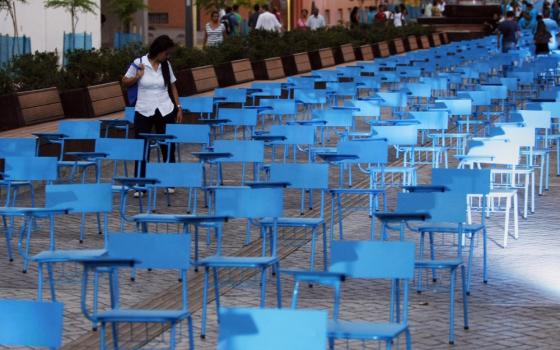Following the posting of my last GSR Today blog Getting on the learning curve about human trafficking awareness, one of our readers tipped me off to a story from Cedar Rapids, Iowa. It’s about a couple of Sisters of Mercy and truckers.
I had already discovered the group Truckers Against Trafficking and was trying to figure out how to include it in my previous blog. Alas, I already had included many links to resources. Voilà! Here was the connection!
So I called up Sr. Emily Devine to find out how this connection developed. Emily retired in 2011 from her hospital chaplaincy ministry. But we hope you all realize by now that women religious don’t really retire. No, we’re just freed up to become engaged in other endeavors. For Emily it meant involvement in jail ministry and in anti-trafficking efforts. And it’s a story that also illustrates the changing role of women religious today: as initiators, catalysts, collaborators and connectors. With plenty of dogged persistence thrown in and a willingness to let others take the lead.
Emily had already been learning about trafficking. What intrigued her was that “no one thought it was a problem” in her area. (If you watched the first segment of “A Path Appears” Monday night on PBS, you heard this is a major obstacle.) But they discovered otherwise. So Emily began to lay the groundwork for what developed into Sisters and Brothers Collaborating Against Trafficking, a local group that formed about a year ago.
As she said “they plugged away” but kept moving forward, searching for a way to become more involved. Emily’s brother had been a truck driver, so she talked with him about his experience. Kirkwood Community College, which is located in Cedar Rapids has a truck drivers training program. Mount Mercy University has a BMA program with students available to do research and help plan strategy. Add in the Iowa Department of Transportation, law enforcement and medical professionals. More connections.
In December, Kirkwood, Truckers Against Trafficking and Sisters and Brothers Collaborating Against Trafficking teamed up to offer a workshop for truckers and instructors at Kirkwood. Hence the story. And it’s expanding from there. More people are contacting them now about what they can do.
When we are faced with situations like human trafficking, many of us probably just shut down. Become paralyzed and think there is nothing we can really do. “Start where you are,” is the wisdom Emily offers.
Look around, raise awareness, make connections and follow where it leads.
It’s what the truckers did. They noticed what was happening at rest stops, truck stops and motels. They joined together to do something about it. They keep moving on. They’ve just launched a Freedom Riders Project, hitting the road with a truck containing an educational exhibit about human trafficking.
Other professions are doing the same. This fall Massachusetts General Hospital and the Massachusetts Medical Society issued “Human Trafficking: Guidebook on Identification, Assessment and Response in the Health Care Setting.” Just the other day, someone sent me a report from the Department of Education, “Human Trafficking in America’s Schools.” ECPAT has developed training for hotel workers and codes of conduct for the travel industry. The Iowa Department of Transportation has developed a model program to enlist truckers in being the eyes and ears on the road. Word of the National Hotline number 1-888-373-7888 or BeFree text number (233733) is spreading through all kinds of avenues.
This is only a small sample of what’s happening. There are many more stories out there. A movement is building. All starting with where we are.
[Jan Cebula, OSF, is liaison to women religious in the United States for Global Sisters Report.]
